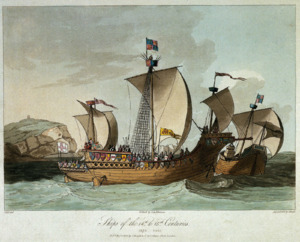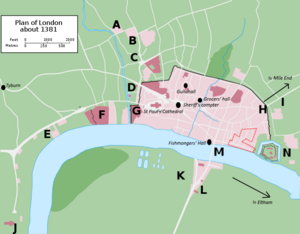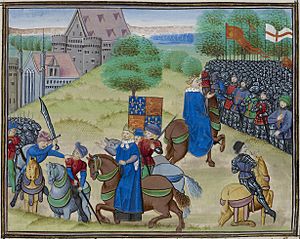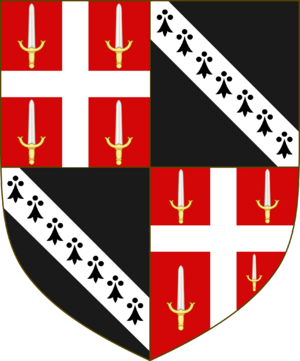John Philipot (MP) facts for kids
Quick facts for kids
John Philipot
|
|
|---|---|
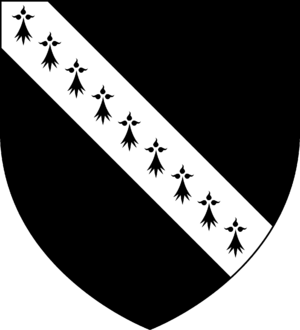
Arms of Philipot: Sable, a bend ermine.
|
|
| Lord Mayor of London | |
| In office 1378–1379 |
|
| Preceded by | Nicholas Brembre |
| Succeeded by | John Hadle |
| Personal details | |
| Died | 1384 |
Sir John Philipot (died 1384) was an important English merchant and a leader in London. He was part of the Grocers' Company, a powerful trade group. He served as a Member of Parliament for London in 1371 and 1381.
Philipot was a strong opponent of John of Gaunt, a powerful duke, during the early years of King Richard II's rule. In 1377, he was chosen by the House of Commons to help manage money for the war with France. He became Lord Mayor of London in 1378. Sir John Philipot also played a key role in helping King Richard II during the Peasants' Revolt in 1381. A street in London, Philpot Lane, is named after him.
Contents
John Philipot's Early Life
John Philipot was likely from Kent, a county in England. His family used the same coat of arms as other Philipots from the Tunbridge area. His first wife brought him a large estate called the Grench (or Grange) in Gillingham, near Chatham.
Serving King Edward III
Philipot joined the Grocers' Company of London. This group was formed in 1345 by combining pepper and spice merchants. He quickly became very wealthy. King Edward III trusted him. In 1362, the King gave him the care of Sir Robert de Ogle's heir. In 1363, Philipot was made a receiver of goods that were taken as penalties at Calais. The next year, he was allowed to send wheat and other food there.
Philipot often lent money to the King and helped manage his payments. He represented London in Parliament in February 1371. During this time, church leaders were removed from government roles. Philipot also attended a special council in June to fix problems caused by the new leaders.
Standing Up to John of Gaunt
After a period known as the "Good Parliament," John of Gaunt, the Duke of Lancaster, became very powerful. Philipot, along with other London leaders like Nicholas Brembre and William Walworth, opposed John of Gaunt. The Duke tried to reduce London's power and change how the city was run.
In January 1377, John of Gaunt tried to replace London's mayor with a "captain." He also wanted to give his marshal the power to arrest people in the city. This idea, along with an insult to the Bishop of London, caused a riot the next day. John of Gaunt and his ally had to flee for their lives. Philipot led a group of citizens to meet the old King Edward III. They explained their actions, and the King gave them a kind answer. However, the Duke was still angry. The King, influenced by the Duke, removed the mayor. But the citizens quickly chose Brembre as the new mayor.
Helping King Richard II
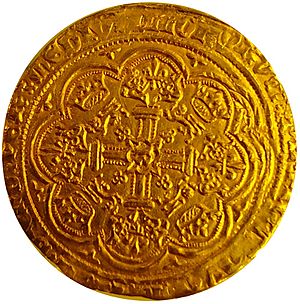
When King Edward III died in June 1377, a group of important citizens went to meet the young King Richard II and his mother, Joan of Kent. Philipot spoke for the group. He promised the city's loyalty and asked the King to help them make peace with John of Gaunt.
In October 1377, Philipot and William Walworth were chosen to manage the money for the war with France. This showed that the ideas of the "Good Parliament" were back in favor. They and other London merchants lent the King 10,000 pounds.
Protecting England's Coasts
Meanwhile, the French captured the Isle of Wight and burned Hastings. A Scottish privateer named Mercer also captured many English merchant ships near Scarborough. This made the country very worried. Philipot quickly prepared his own small fleet of ships and a thousand armed men. He chased Mercer, took back the English ships, and captured fifteen Spanish vessels too.
His brave actions made people very proud. They compared his success to the lack of action from the nobles and John of Gaunt. The nobles were annoyed and joked that Richard was "king of London." They said Philipot had no right to act on his own. But Philipot told the Earl of Stafford that if the nobles had protected the country, he wouldn't have needed to step in.
Serving as Lord Mayor
At the peak of his popularity, Philipot was chosen as Lord Mayor for 1378–1379. He was very active and generous in this role. He had the city's defensive ditch cleaned, collecting a small tax from each household for the work. He also made sure that law and order were kept. His good work was remembered and used as an example many years later.
In 1379, a nobleman named Lord Beauchamp of Bletsho named Philipot as one of the people to carry out his will. He gave Philipot a special gilded cup. The year after his time as mayor, Philipot paid for one of two stone towers built near London Bridge. These towers, sixty feet high, had a chain stretched between them across the river. This chain helped protect the city and its ships from possible French attacks.
In the summer of 1380, Philipot provided ships for the Earl of Buckingham's trip to Brittany. Many soldiers had to pawn their armor because of delays. Philipot, as he told a chronicler, bought back the armor for a thousand soldiers.
Role in the Peasants' Revolt
During the Peasants' Revolt in June 1381, Philipot helped the young King Richard II. When Mayor William Walworth killed Wat Tyler, the leader of the revolt, in Smithfield, Philipot and four other aldermen were knighted by the King on the spot. He was given a special addition to his coat of arms. King Richard also gave him an estate that earned 40 pounds a year. In November, he again represented London in Parliament.
In May 1382, Philipot was part of a group of merchants. They discussed a loan for the King's trip to France. He was also put in charge of managing taxes used to keep the sea safe. However, the new mayor, John of Northampton, who was trying to reduce the power of big companies, removed Philipot from his position as alderman. In 1383, Philipot helped arrange transport for Bishop Spencer and his crusaders. He also served in Parliament for London in October.
Death and Lasting Impact
Sir John Philipot died in the summer of 1384. People said he had no equal in his dedication to the King and the country. He was buried with his second wife in the Greyfriars Church (now Christ Church) in London.
He left his manor in Gillingham to his second son. His house in London was in Langbourne Ward. The street there, Philpot Lane, was named after him. He also left land to the city of London to help thirteen poor people forever.
Philipot was married at least twice. His first wife was Marjery Croydon, who brought him the Gillingham manor. His second wife was Jane Stamford. He had two sons and a daughter named Margaret.
See also
 | William L. Dawson |
 | W. E. B. Du Bois |
 | Harry Belafonte |


